Herbal teas are some of the most effective home remedies for cough. They are warm and nice to drink and provide you with important fluids. Herbal teas also contain natural compounds that help relieve cough and chest congestion and clear out phlegm.
Read this guide and learn more about the best herbal teas for cough relief!
I will also explain what causes coughing in the first place and give my best tips for alleviating its symptoms and recovering faster.
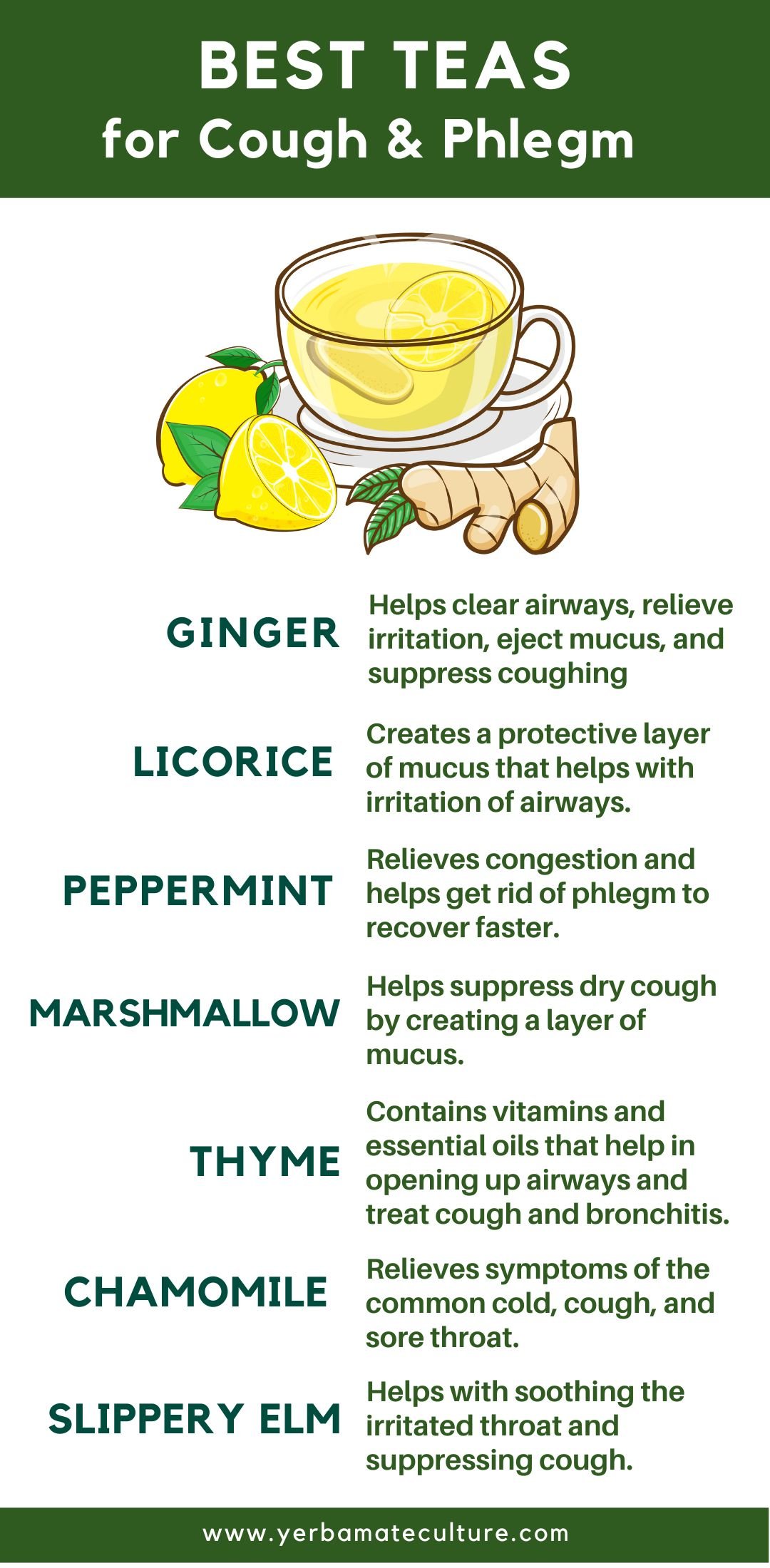
What Causes a Cough?
Coughing is a reflex action that aims to clear your throat of irritating substances such as mucus.
It’s normal to cough every once in a while even when you are not sick or there is no specific reason for it. But certain conditions may cause more frequent and stronger coughs.
Common causes of cough include:
- Normal Clearing of Throat: Coughing is our body’s way of clearing the throat and can happen because dust, smoke, or mucus is clogging the airways. This is nothing to be worried about but it can still be a good idea to drink some herbal tea to soothe the irritated throat.
- Pathogens: One of the most common reasons for acute cough is a respiratory tract infection caused by bacteria or viruses. It’s usually accompanied by other symptoms of cold or flu, such as a runny nose, fever, and body aches.
- Asthma: A wheezing cough is a common problem related to asthma and is often treated by using an inhaler.
- Smoking: Cigarette smoking can cause a chronic cough with a distinctive sound.
Best Herbal Teas for Cough, Phlegm & Chest Congestion
1. Ginger Root Tea
Ginger root tea is a traditional cough remedy in Chinese and Indian medicine. Ginger has anti-inflammatory properties and its spiciness helps with opening up your airways.
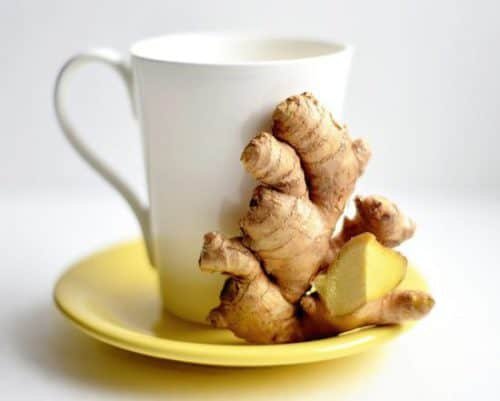
The beneficial effects of ginger have been reported in the literature and there is also research-based evidence that ginger helps with relaxing the muscles of airways.
A study performed on 92 asthma patients suggests that ginger significantly helps with nocturnal coughing, wheezing, and chest tightness.
The benefits of ginger in treating cough:
- It contains gingerol and shogaol, which are the main active ingredients related to its health benefits. They are antimicrobial compounds that help with fighting the viruses causing cough and sore throat.
- It has a high concentration of antioxidants that help your body with getting rid of pathogens by boosting your immune system.
- Its anti-inflammatory properties may help with chest and throat inflammation associated with cough.
- It stimulates mucus secretion which helps in clearing your airways from mucus and relieves the irritation that causes coughing.
- The oleoresin of ginger has antitussive abilities, that may help with suppressing a cough.
- It is an expectorant, meaning it helps with loosening and ejecting of mucus from your lungs.
- It helps with unclogging your sinuses and allowing phlegm to exit.
As you can see, ginger tea is one of the best herbal teas for cough!
It is completely natural and doesn’t cause any side effects unless consumed excessively. Also, I think that it tastes very good. Just smelling it and inhaling the steam evaporating from ginger tea helps.
How to Make It
You can easily prepare some tasty tea from fresh ginger by following this recipe.
If you want to make things a bit easier, there are also many excellent ginger tea products available. To help you with finding the best brands, I have put together an article with my favorite ginger tea brands.
2. Licorice Root Tea
Licorice root is commonly used in Traditional Chinese Medicine and it’s known for its antiviral and antimicrobial abilities. It is used to relieve irritating cough caused by itching and irritation of the throat and bronchial tubes.
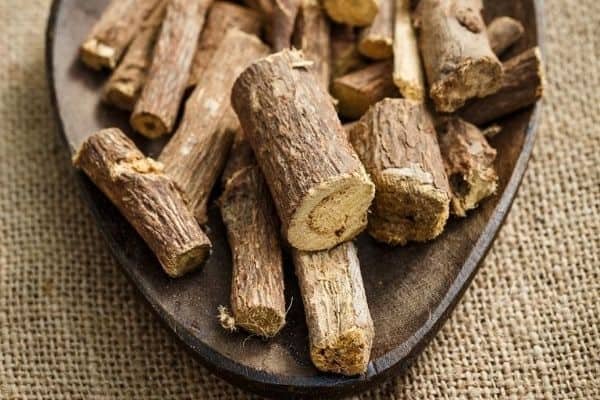
Licorice tea enables your body to create a protective layer of mucus that relieves the irritation in your airways.
It works best when you gargle it in your mouth for a while before swallowing it.
In general, licorice is considered to be safe. However, persons with heart disease, kidney disease, or high blood pressure should avoid consuming large amounts of it.
How to Make It
Boil some water and add sliced or ground licorice root. You can use about one tablespoon of sliced licorice root per one cup of water. If the root is ground, a smaller amount will do. Then cover it and let steep for about 10 to 15 minutes.
Looking to buy some licorice root or licorice tea bags?
Check out my guide with the best licorice tea products on the market.
3. Peppermint Tea
The strong odor of peppermint helps with opening up airways and makes breathing easier. It also acts as an expectorant, meaning it helps with getting rid of phlegm and recovering faster.
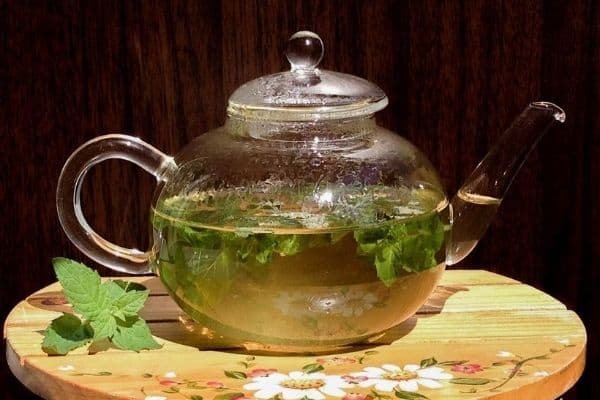
In addition, mint tea has anti-bacterial and anti-inflammatory properties that help with reducing the respiratory inflammation often associated with coughing.
One of the strongest active compounds of mint is menthol, which is anti-inflammatory, antibacterial, and helps in breaking down mucus and soothing an itchy and sore throat.
Peppermint has the highest concentration of menthol. Peppermint oil contains up to 48% of menthol while spearmint only contains a very minimal amount of it.
Both drinking peppermint tea, and inhaling peppermint vapor, are good for relieving cough.
How to Make It
You can make mint tea with fresh (or dried) mint leaves by adding boiled water and steeping for 5 to 10 minutes.
I also recommend that you take a look at my article with the best mint tea products if you are planning on buying some. Whether you are looking for pure mint tea or a blend of mint and other herbs, you can find some great products there.
Recipe Suggestion
Have you already tried Moroccan mint tea?
It’s one of my favorite drinks after a meal. Although spearmint is commonly used for brewing it, you can also use peppermint or a mixture of both.
Check out this authentic Moroccan mint tea recipe and make some at home!
If you don’t want to prepare tea at home, I recommend that you read my guide with the best Starbucks teas for sore throat and cough.
4. Marshmallow Root Tea
Marshmallow is a traditional cure used by Native Americans, especially for treating respiratory illnesses such as coughing. It is good for relieving a strong and painful, spasmodic dry cough.
Marshmallow works similarly with licorice root, it forms a layer of protective mucus that prevents coughing.
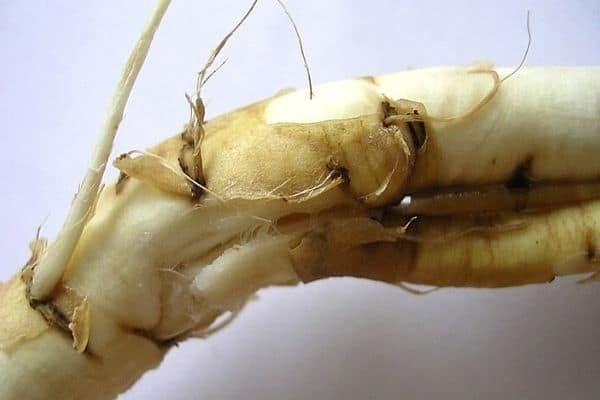
There is a small study available where cough syrup containing marshmallow root along with other ingredients was used to treat cough. In the study, the herbal cough syrup was found to be effective.
Marshmallow root has not been researched thoroughly, but it is considered safe to use. However, it should not be given to children under 3 years old.
How to Make It
The easiest way to enjoy a cup of this herbal tea is by ordering Organic Marshmallow Tea from Buddha Teas.
5. Thyme Tea
Thyme tea is considered to be one of the best herbal remedies for cough and chest congestion.
The essential oil from its leaves helps in opening up airways.
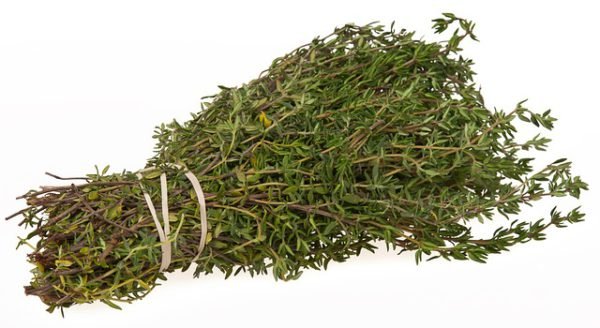
Thyme also contains a lot of vitamin C and vitamin A which can boost your immune system. When you prepare thyme tea it is recommended to inhale the steam because it can offer additional help with opening your respiratory tracts.
A study where an extract containing thyme and ivy leaves was given to adults suffering from bronchitis and cough, indicates that thyme has potential in helping with a cough. In this study, no side effects were noted and thyme is generally considered safe to use.
How to Make It
If you have fresh thyme at home, you can easily make a tasty herbal infusion with it. Just steep the herb in freshly boiled water for about 10 minutes.
For an easier option, I recommend Buddha Teas Organic Thyme Leaf Tea.
6. Chamomile Tea
Chamomile is known to help with pain and it has anti-inflammatory properties thanks to the oils that its flowers contain.

Studies indicate that inhaling the steam that contains chamomile extract helps with relieving symptoms of common colds.
Chamomile can also lubricate your throat and help with a sore throat and hoarse voice.
How to Make It
You can make a cup of soothing chamomile tea with fresh or dried chamomile flowers.
Find my favorite chamomile tea products in this article.
7. Slippery Elm Tea
Slippery elm is a tree that grows in the central and eastern parts of North America.
Native Americans have used slippery elm for centuries as a natural relief for coughing.

It acts in a similar way as marshmallow root because it also contains a high amount of mucilage. Inner barks of particular elm species are used for preparing the tea.
Hot tea made of slippery elm soothes the throat and suppresses cough by creating a protective mucus layer and increasing the lubrication. It can also help with throat infections that can be the reason for coughing.
There is not yet enough research on the benefits of slippery elm, but experiences on its use are promising.
How to Make It
To make slippery elm tea, pour boiled water over slippery elm bark powder and steep for a few minutes. Use about one teaspoon of powder per cup of tea.
You can order organic slippery elm bark from Amazon.
3 Effective Tea Recipes for Cough
So it’s a good thing that many powerful herbal teas can relieve your cough and sore throat.
But what can be even more effective than using a single herbal ingredient, is blending them or adding other ingredients such as honey and lemon!
Here are some combinations that in my experience are more effective than any single-component herbal tea:
1. Ginger, Honey, and Lemon Tea
As explained earlier, ginger tea is a very effective cough remedy. But what if you would enhance it by adding two powerful ingredients like honey and lemon juice?
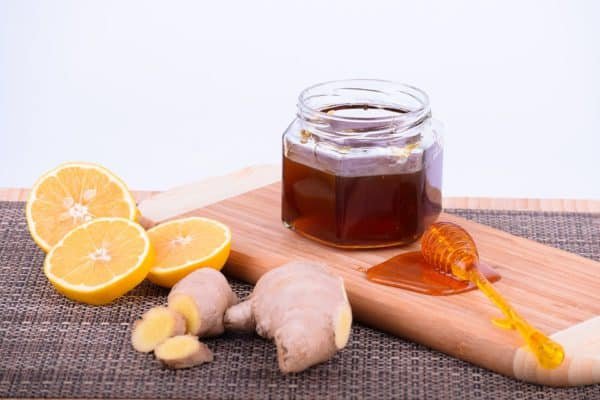
According to this study from 2007, honey can relieve cough even better than cough syrup that contains dextromethorphan.
Ingredient Tip
It’s best to use organic raw honey that has plenty of phytonutrients and antibacterial and antifungal power.
Honey also contains beneficial enzymes. These delicate compounds are often destroyed when honey is processed.
You can find high-quality organic honey on Amazon.
Adding a dash of fresh lemon juice gives a nice flavor and contains vitamin C as well as antioxidants.
By combining these three ingredients you can make a tea that is not only very potent in treating cough but also tastes delicious!
This blend is my personal favorite and I always drink it when I get a cough.
2. Licorice, Chamomile, and Peppermint Tea
Try this nice and gentle combination of three herbs before going to sleep.
Chamomile eases your pain and lubricates the throat while the licorice root soothes the mucous membranes and gives a natural sweetness to the tea.
Peppermint is the final touch that gives a pleasant and fresh taste and helps open up your nose and throat!
3. Thyme, Marshmallow Root, and Wild Cherry Bark Tea
Thyme opens up your airways and provides important vitamins while marshmallow root helps with soothing the irritated throat.
Add some wild cherry bark that acts as an expectorant and helps to clear out the phlegm in your throat and lungs. And why not pour in some raw honey to make it even more effective and tasty!
Treat Your Cough with Home Remedies
Herbal teas are an excellent natural way of fighting cough and easing its symptoms. Another great thing is, that these teas taste very good!
If you have a normal cough that is often paired with a common cold, use these herbal teas and rest for a few days.
This should help you with getting better so that you can return to normal activities.
In addition to drinking herbal teas, there are a few other home treatments that you can try:
My 5 Best Tips for Treating a Cough
1. Fluids and Rest: Keep your body hydrated and try to rest as much as possible. This will allow your body to focus on recovering.
2. Avoid Irritants: Avoid exposing yourself to any irritants such as smoke or dust.
3. Elevate Your Head: Use extra pillows to elevate your head when you are sleeping or resting.
4. Hot Shower: Taking a hot shower can make you feel better and help with getting the phlegm out of your body.
5. Herbal Teas: Use the herbal teas introduced in this guide to relieve congestion, get rid of mucus, suppress coughing, and boost your immune system. Drink the teas frequently throughout the day and especially at bedtime to help you sleep better.
If your cough is very severe, and you have difficulties with breathing or sleeping, or it has lasted for more than a week, you should probably go and see a doctor.
Cough FAQ
What is causing a cough?
Coughing is caused by a reflex action aiming to clear your throat. Viruses and bacteria that cause a respiratory infection are the most common causes of cough.
What is the best tea for cough?
Based on research and my own experience, ginger tea with honey is the best tea for treating a cough. You can also try licorice, peppermint, and thyme for making a herbal infusion.
Is thyme tea good for treating a cough?
Thyme tea contains essential oils that can help with opening up airways. It also contains vitamins C and A that can boost your immune system. I recommend adding other herbs such as ginger and licorice to make your tea more effective.
Is peppermint tea good for dry cough?
Peppermint tea can help with relieving congestion and getting rid of phlegm. However, I recommend adding some licorice or marshmallow root to relieve the itchiness of the throat related to a dry cough.
I hope you found this article useful and that the herbal teas introduced here will help if you get a cough.
Tell us your opinion about the best tea for cough. Is it missing from this article? Please share your thoughts and experiences in the comments section below.
Have you already tried Pukka Peppermint & Licorice herbal tea?
It is a super delicious herbal tea and provides an excellent natural remedy for cough, sore throat, and flu.
Enjoy your tea and stay healthy!
-Joonas

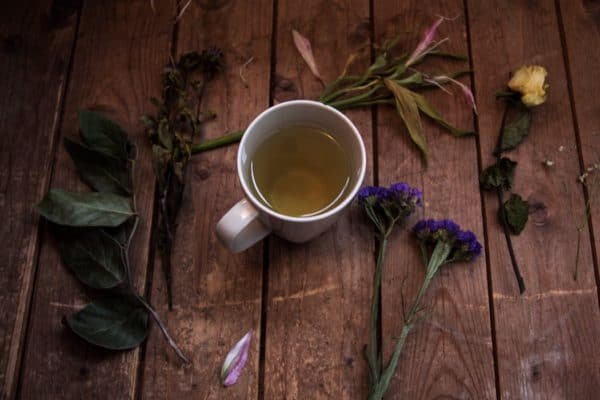
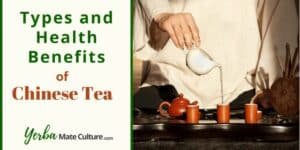



I’ve recently been having a cough, cough syrup doesn’t seem to be helping as much nowadays. This could be my saving grace! The flavors which most stick out to me are ginger and marshmallow, but I might try others, a good cleanse is what I need. Great post, thanks for the advice!
Thanks for your comment Scott. I hope herbal teas can provide some help for your cough and you will get well soon!
-Joonas
Hi Joonas, I’m glad to have a read at this post! People are more likely to get cough this period of time when the season is changing. I think the herbal teas you mentioned in your post will be favored by many people. After all, people prefer drinking teas other than medicines. Personally, I have tried before the combination tea of ginger, honey, and lemon. Surprisingly, it tastes so good!
Hi Shaun!
Yes, ginger, lemon, honey tea really tastes good! I also like mint and licorice tea. It’s always better to go with natural remedies instead of taking factory produced medicine unless you get really sick. But nowadays people tend to take too many medicines even for small problems like a minor cough. Thanks for your comment and have a great day!
-Joonas
I have heard of teas that help the cough and the throat when you have a cold. I do have a question for you, how many times do you drink the tea? Does it help you stop coughing until you have to drink the tea again? And is it safe for kids?
Thanks for your comment and questions Claudia!
I usually drink as much herbal tea as I feel like having. For example, if I feel very sick and I’m just laying on the bed, I make a big thermos full of ginger, honey, and lemon tea and keep on sipping it constantly because it makes me feel better.
Sometimes, if I’m not that sick, I will just prepare some herbal tea in the morning, after lunch and before going to bed. It really depends on the tea and how sick you are, but herbal tea can help you stop coughing for several hours. Unfortunately, sometimes a cough is so bad that nothing seems to really help for a long time. In this scenario, you just have to keep on sipping some strong herbal tea constantly.
All of the herbal teas listed here are safe for kids over 3 years old. However, I would be a little bit careful with marshmallow root, licorice root, and slippery elm tea, better not to give too much of those for young children.
-Joonas
Hi Joonas,
I’m a huge tea nut and have tried all of these separately or together at one point in time. I have found that the best tea for me personally when I have a sore throat or cough is something called throat comfort by Yogi Tea. It has a lot of the things you discussed above in it to include licorice root and ginger root. I mix it with some honey and it’s a lifesaver. I am going to try something with wild cherry bark next time as I think that may be the one up there I haven’t tried. Thank you for the great post!
Hi Dan!
I haven’t tried throat comfort from Yogi, but I will for sure try it soon since you recommend it! Go ahead and try the wild cherry bark, it’s very nice. Thanks for the comment!
-Joonas
where can I find yogi tea???
You can order Yogi Throat Comfort Tea from Amazon.
Ginger, honey, and lemon tea have proved itself during many flu epidemics over and over again, it’s a bomb for bacteria. It’s amazing how nature takes care of us. Thanks for sharing this fantastic information.
Hi Ivan!
Yes, I also use ginger, honey, and lemon tea every time I have a cough and flu, it works really well. Thanks for your comment!
-Joonas
I read the information and enjoyed it very much. Even I learned something that I never knew about it. Thank you very much.
Hi Ashes,
I’m very happy to hear that you liked my article and found it useful!
Best Regards,
Joonas
Please add Mullein to this list! It always keeps me from getting pneumonia! It is truly a game-changer!
Hi Allison,
Thanks for the tip, I’ll definitely add mullein tea here!
-Joonas